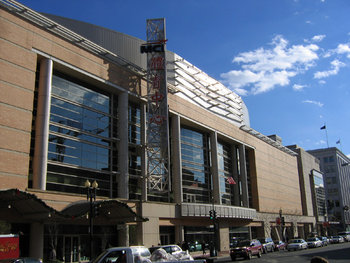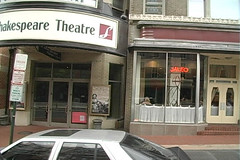Did MCI Center really miraculously improve DC's east end?
 Is MCI Center just a different kind of big box?
Is MCI Center just a different kind of big box?This comes from something I wrote on a local e-list, but I was gonna write something similar in response to Henry Jaffe's column in today's Examiner, "Go ahead and call it a comeback."
To state first, I am not against a baseball stadium, or a new one, just public funding of one. The reason these questions are so wrenching is played out in the discussion thus far, especially over MCI Center. To my way of thinking, MCI had little impact on the success of 7th St. NW/Downtown East, because:
1. It is the longest stretch of extant historic buildings remaining downtown, with traditional pedestrian rhythm along the street, i.e., approximately 40' wide storefronts, and decent independent retail and restaurants.
2. Businesses and cultural uses, particularly Jaleo and the Shakespeare Theater, had already seeded the corridor for success.

3. A decreasing inventory of available land in the central and west areas of the central business district would have forced developers eastward regardless.
4. Other public policies, such as encouraging the development of housing downtown (the "Living Downtown" iniatiative and the ongoing advocacy by people like Terry Lynch and the Downtown Cluster of Congregations), and this housing has been built almost entirely in the "East End."
5. The fact that the scheduling of Arena events makes it difficult for people to patronize places other than in the Arena, because people work late in DC, and scoot right to the Arena.
6. The failure of many of the first-entry businesses in the area, such as "The Rock,: Discovery Zone, restaurants in the Arena, etc.
Arguably, the most important change in the general environment was mayoral succession, which changed the investment climate significantly, particularly amongst the largest commercial developers. It seems like a long time ago, but it wasn't until late 2001 (arguably), I would say late 2002 that the city real estate market really took off, particularly eastward.
On the other hand, one can argue that:
1. The MCI Center was a significant private investment that encouraged other private investors to investigate and launch other projects.
 Housing Downtown constructed by Pritzker interests. Photo by Dan Malouff.
Housing Downtown constructed by Pritzker interests. Photo by Dan Malouff.2. Gallery Place, as corporate as it is, would maybe never have been built, had MCI Center not come along (I remember that sign, announcing the development ever since I came to DC in 1987).
3. MCI Center's location in the core of the city brought about new levels of "sampling" of the urban experience on the part of suburbanites. This point has been made convincingly to me by someone that I really respect.
In either case, I think that we have to accept that MCI Center accelerated development, although I do think it's hard to separate out the impact of the political changes, and I still tend to agree with Donovan Rypkema, who argues that the impact of sports facilities only occurs in about a 1.5 block radius. Still, that the ground floor development in the area has retail and restaurants is due in large part to the impact of MCI Center.
I think what this does argue for is a great location decision, that spinoff development is unlikely or at least reduced, if the stadium-arena isn't well located and situated. I think most examples of sports facilities provided (Camden Yards, Jacobs Field, etc.) argue that Don Rypkema is probably right.
Don't think the Riverfront is a slam dunk. The Rock and Roll Hall of Fame in Cleveland, all alone on the Lake Erie, hasn't done much in the way of promoting new development. (Great cd jukeboxes though...)
This all comes back to connections and urban design. Locating the stadium at RFK will cost less, but it won't generate much in the way of spillover investment, unless there is serious site planning and change in that area. (The stadium argument reminds me of the Iraq "debate" because we are damned if we do and damned if we don't.)
One of my problems with the current site, and I agree with Tom's points about M St. SE, in fact I wrote a blog entry about that on Sunday, is that the "entertainment-retail" district will have to be created, and that by default, it's likely to be all chains, just like Gallery Place, and clones of PowerPlant Live in Baltimore, Fourth Street Live in Louisville, Kentucky, and every other similar chained retail-tainment environment across the country. Such comes at a great cost, as we continue to nibble away at DC's authenticity and competitive advantage from many directions.
I wrote about that in my blog on Tuesday, specifically about the artificiality of Cordish and Western Development projects; similarly I wrote about this in July in a blog entry entitled "(Why aren't people) Learning from Jane Jacobs."
I just don't see the advantage of putting large public investments into such projects, even though this project will help the city extract consumer dollars from the suburbs. Investing city monies into something like the www.dctransitfuture.com project, bringing Streetcars back to many parts of the city, would likely generate far more economic return.
If sports leagues weren't allowed to rape municipalities with such impunity, we'd be in a much different place. Abe Pollin wanted to locate in DC, so that made him much more malleable than MLB, which would prefer DC, but was able to play DC off Virginia to its advantage. Now, if Congress could move from such important sports issues as steroids and the College Football Championship Series to how municipalities are manipulated and let themselves be used in terms of building stadia and arenas for private sports teams, I'd feel much better about all of this.
Index Keywords: stadiums-arenas; urban-revitalization



1 Comments:
Thank you so much for providing the data you need, and thank you for sharing.
Post a Comment
<< Home